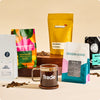Have you ever been given the choice between iced coffee and cold brew at a coffee shop, and wondered what the difference was? The term “iced coffee” can really mean any way to brew cold coffee that doesn’t involve espresso.
Making cold brew, therefore, is making iced coffee. But brewing hot coffee and chilling it is also making iced coffee. Here are the key differences between our two favorite iced coffee brewing methods, cold brew and flash brewing.
Brewing methods compared
To really understand the differences between cold brew vs iced coffee, it’s important to note it all starts with the brewing process.
Iced Coffee: Flash brewing (also known as flash-chilled coffee) is the process of brewing hot coffee, usually double-strength, and quickly chilling it with ice. This can happen either by brewing coffee directly over ice (like with a pour over), or by adding ice to the coffee after it has been brewed.
Cold Brew Coffee: So while traditional iced coffee involves hot brewed coffee poured over ice, cold brew coffee is slightly different. Cold brew refers to coarse ground coffee that is brewed with cold water for an extended amount of time. Since cold brew is made with cold or room temperature water, the extraction process is slower. It must be brewed for 12 to 18 hours in order to extract all of the flavor possible, with water and coffee grounds making contact for the entire 12 to 18 hour window.
These differences in time and temperature play a part in the eventual flavor differences between the two brews.
Differences in taste
Now that you know the brewing method for each one, it's time to look at how they differ in taste.
The slow, gentle cold brew process brings out more sweetness, bypassing higher acidity due to the use of cold water. In coffee extraction, acidity is extracted first, then sweetness, and finally bitterness. But watch out for over and under extraction — anything less than 12 hours the coffee might not be sweet enough, whereas anything beyond 18 hours will yield bitter flavors. Additionally, its brewing process means higher caffeine content and a much richer flavor.
Many recipes tend to use medium to dark roast coffees with deeper sugar browning flavors to create a mild, sweet cold brew concentrate that tastes great with sugar and milk. In addition to these mild yet deep flavors, the texture of cold brew tends to be very full and creamy.
On the other hand, flash-brewed iced coffee yields brighter, more nuanced flavors. The quick extraction process using hot water brings out more nuance and acidity. Also in contrast to cold brew, iced coffee has a lighter, more tea-like body and more distinct aromatics. Not to mention, since the hot brewed coffee is diluted ice, it tends to have less caffeine content than cold brew.
The final verdict
So how do you choose? It all comes down to how you like your coffee. If you prefer lighter roasted coffees with more acidity, flash-brewed iced coffee might be the right choice for you. If a smooth, mild, medium to dark roast with milk and high coffee concentrate is more your preference, cold brew would be a perfect choice. Whether you prefer the control of a pour over or the convenience of a drip coffee maker, we have a recipe for how to make iced coffee that is both delicious and easy.









